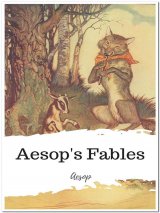Aesop's Fables Page #20
Aesop's Fables, or the Aesopica, is a collection of fables credited to Aesop, a slave and storyteller believed to have lived in ancient Greece between 620 and 564 BCE.
THE THIEF AND THE INNKEEPER A Thief hired a room at an inn, and stayed there some days on the look-out for something to steal. No opportunity, however, presented itself, till one day, when there was a festival to be celebrated, the Innkeeper appeared in a fine new coat and sat down before the door of the inn for an airing. The Thief no sooner set eyes upon the coat than he longed to get possession of it. There was no business doing, so he went and took a seat by the side of the Innkeeper, and began talking to him. They conversed together for some time, and then the Thief suddenly yawned and howled like a wolf. The Innkeeper asked him in some concern what ailed him. The Thief replied, "I will tell you about myself, sir, but first I must beg you to take charge of my clothes for me, for I intend to leave them with you. Why I have these fits of yawning I cannot tell: maybe they are sent as a punishment for my misdeeds; but, whatever the reason, the facts are that when I have yawned three times I become a ravening wolf and fly at men's throats." As he finished speaking he yawned a second time and howled again as before. The Innkeeper, believing every word he said, and terrified at the prospect of being confronted with a wolf, got up hastily and started to run indoors; but the Thief caught him by the coat and tried to stop him, crying, "Stay, sir, stay, and take charge of my clothes, or else I shall never see them again." As he spoke he opened his mouth and began to yawn for the third time. The Innkeeper, mad with the fear of being eaten by a wolf, slipped out of his coat, which remained in the other's hands, and bolted into the inn and locked the door behind him; and the Thief then quietly stole off with his spoil. THE PACK-ASS AND THE WILD ASS A Wild Ass, who was wandering idly about, one day came upon a Pack-Ass lying at full length in a sunny spot and thoroughly enjoying himself. Going up to him, he said, "What a lucky beast you are! Your sleek coat shows how well you live: how I envy you!" Not long after the Wild Ass saw his acquaintance again, but this time he was carrying a heavy load, and his driver was following behind and beating him with a thick stick. "Ah, my friend," said the Wild Ass, "I don't envy you any more: for I see you pay dear for your comforts." Advantages that are dearly bought are doubtful blessings. THE ASS AND HIS MASTERS A Gardener had an Ass which had a very hard time of it, what with scanty food, heavy loads, and constant beating. The Ass therefore begged Jupiter to take him away from the Gardener and hand him over to another master. So Jupiter sent Mercury to the Gardener to bid him sell the Ass to a Potter, which he did. But the Ass was as discontented as ever, for he had to work harder than before: so he begged Jupiter for relief a second time, and Jupiter very obligingly arranged that he should be sold to a Tanner. But when the Ass saw what his new master's trade was, he cried in despair, "Why wasn't I content to serve either of my former masters, hard as I had to work and badly as I was treated? for they would have buried me decently, but now I shall come in the end to the tanning-vat." Servants don't know a good master till they have served a worse. THE PACK-ASS, THE WILD ASS, AND THE LION A Wild Ass saw a Pack-Ass jogging along under a heavy load, and taunted him with the condition of slavery in which he lived, in these words: "What a vile lot is yours compared with mine! I am free as the air, and never do a stroke of work; and, as for fodder, I have only to go to the hills and there I find far more than enough for my needs. But you! you depend on your master for food, and he makes you carry heavy loads every day and beats you unmercifully." At that moment a Lion appeared on the scene, and made no attempt to molest the Pack-Ass owing to the presence of the driver; but he fell upon the Wild Ass, who had no one to protect him, and without more ado made a meal of him. It is no use being your own master unless you can stand up for yourself. THE ANT Ants were once men and made their living by tilling the soil. But, not content with the results of their own work, they were always casting longing eyes upon the crops and fruits of their neighbours, which they stole, whenever they got the chance, and added to their own store. At last their covetousness made Jupiter so angry that he changed them into Ants. But, though their forms were changed, their nature remained the same: and so, to this day, they go about among the cornfields and gather the fruits of others' labour, and store them up for their own use. You may punish a thief, but his bent remains. THE FROGS AND THE WELL Two Frogs lived together in a marsh. But one hot summer the marsh dried up, and they left it to look for another place to live in: for frogs like damp places if they can get them. By and by they came to a deep well, and one of them looked down into it, and said to the other, "This looks a nice cool place: let us jump in and settle here." But the other, who had a wiser head on his shoulders, replied, "Not so fast, my friend: supposing this well dried up like the marsh, how should we get out again?" Think twice before you act. THE CRAB AND THE FOX A Crab once left the sea-shore and went and settled in a meadow some way inland, which looked very nice and green and seemed likely to be a good place to feed in. But a hungry Fox came along and spied the Crab and caught him. Just as he was going to be eaten up, the Crab said, "This is just what I deserve; for I had no business to leave my natural home by the sea and settle here as though I belonged to the land." Be content with your lot. THE FOX AND THE GRASSHOPPER A Grasshopper sat chirping in the branches of a tree. A Fox heard her, and, thinking what a dainty morsel she would make, he tried to get her down by a trick. Standing below in full view of her, he praised her song in the most flattering terms, and begged her to descend, saying he would like to make the acquaintance of the owner of so beautiful a voice. But she was not to be taken in, and replied, "You are very much mistaken, my dear sir, if you imagine I am going to come down: I keep well out of the way of you and your kind ever since the day when I saw numbers of grasshoppers' wings strewn about the entrance to a fox's earth." THE FARMER, HIS BOY, AND THE ROOKS A Farmer had just sown a field of wheat, and was keeping a careful watch over it, for numbers of Rooks and starlings kept continually settling on it and eating up the grain. Along with him went his Boy, carrying a sling: and whenever the Farmer asked for the sling the starlings understood what he said and warned the Rooks and they were off in a moment. So the Farmer hit on a trick. "My lad," said he, "we must get the better of these birds somehow. After this, when I want the sling, I won't say 'sling,' but just 'humph!' and you must then hand me the sling quickly." Presently back came the whole flock. "Humph!" said the Farmer; but the starlings took no notice, and he had time to sling several stones among them, hitting one on the head, another in the legs, and another in the wing, before they got out of range. As they made all haste away they met some cranes, who asked them what the matter was. "Matter?" said one of the Rooks; "it's those rascals, men, that are the matter. Don't you go near them. They have a way of saying one thing and meaning another which has just been the death of several of our poor friends."
Translation
Translate and read this book in other languages:
Select another language:
- - Select -
- 简体中文 (Chinese - Simplified)
- 繁體中文 (Chinese - Traditional)
- Español (Spanish)
- Esperanto (Esperanto)
- 日本語 (Japanese)
- Português (Portuguese)
- Deutsch (German)
- العربية (Arabic)
- Français (French)
- Русский (Russian)
- ಕನ್ನಡ (Kannada)
- 한국어 (Korean)
- עברית (Hebrew)
- Gaeilge (Irish)
- Українська (Ukrainian)
- اردو (Urdu)
- Magyar (Hungarian)
- मानक हिन्दी (Hindi)
- Indonesia (Indonesian)
- Italiano (Italian)
- தமிழ் (Tamil)
- Türkçe (Turkish)
- తెలుగు (Telugu)
- ภาษาไทย (Thai)
- Tiếng Việt (Vietnamese)
- Čeština (Czech)
- Polski (Polish)
- Bahasa Indonesia (Indonesian)
- Românește (Romanian)
- Nederlands (Dutch)
- Ελληνικά (Greek)
- Latinum (Latin)
- Svenska (Swedish)
- Dansk (Danish)
- Suomi (Finnish)
- فارسی (Persian)
- ייִדיש (Yiddish)
- հայերեն (Armenian)
- Norsk (Norwegian)
- English (English)
Citation
Use the citation below to add this book to your bibliography:
Style:MLAChicagoAPA
"Aesop's Fables Books." Literature.com. STANDS4 LLC, 2025. Web. 11 Jan. 2025. <https://www.literature.com/book/aesop%27s_fables_316>.




Discuss this Aesop's Fables book with the community:
Report Comment
We're doing our best to make sure our content is useful, accurate and safe.
If by any chance you spot an inappropriate comment while navigating through our website please use this form to let us know, and we'll take care of it shortly.
Attachment
You need to be logged in to favorite.
Log In